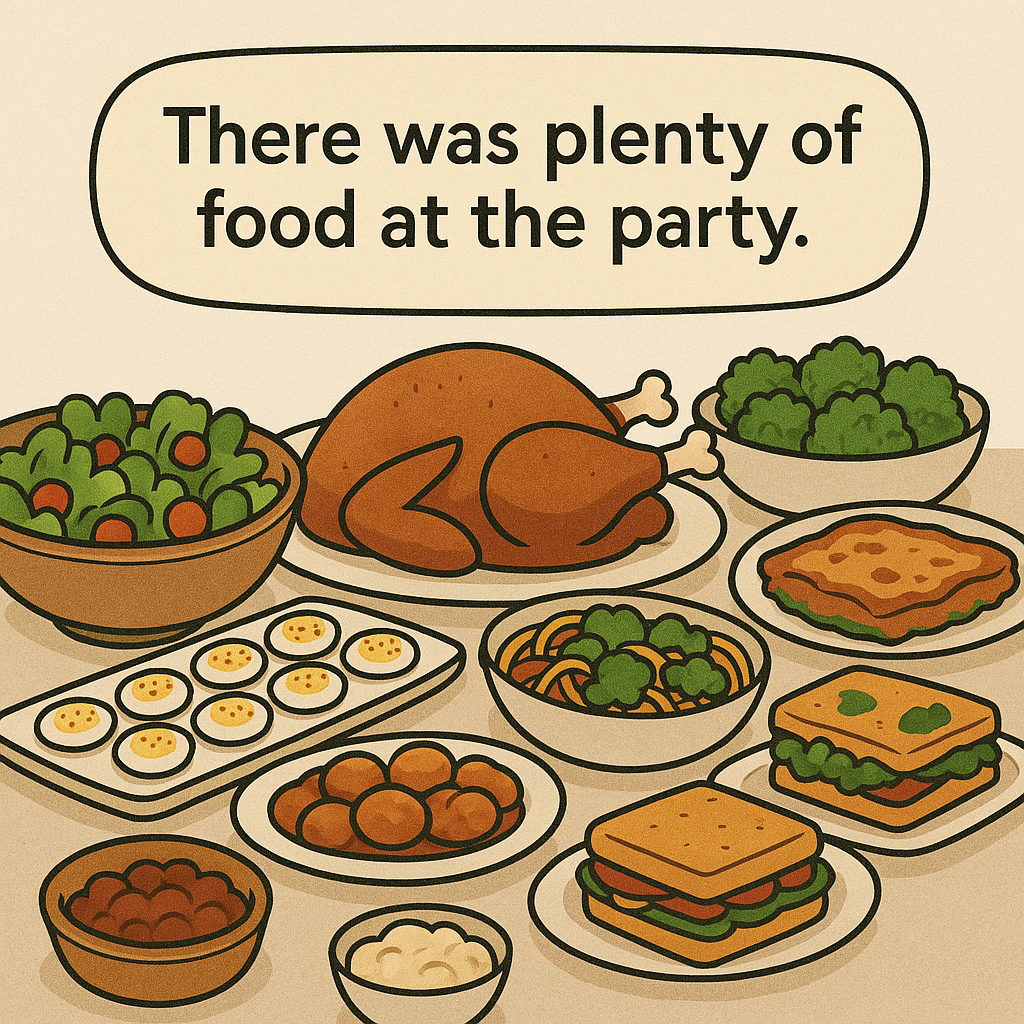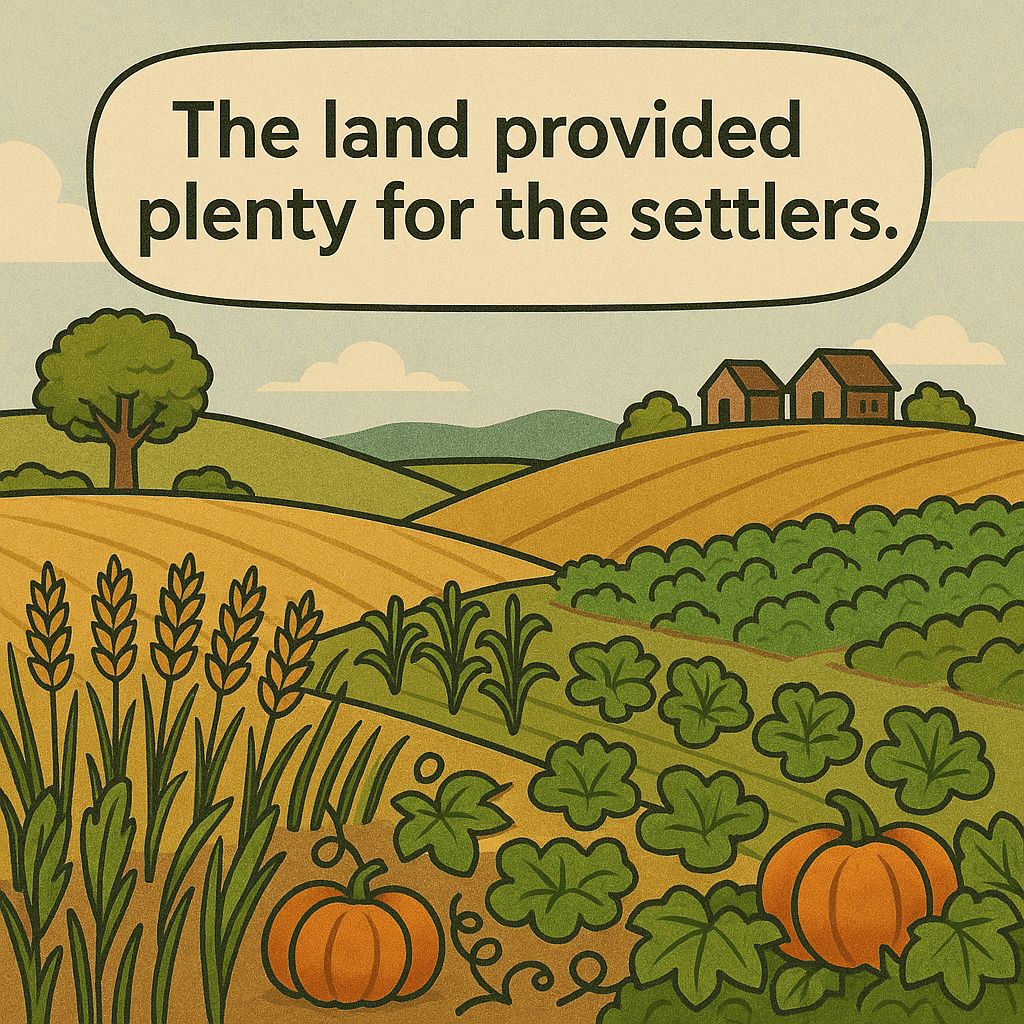Plenty
Definition
Plenty is a noun and adverb. As a noun, it means a large or sufficient amount of something. As an adverb, it is used informally to mean "more than enough."
Parts of Speech
- Noun
- Adverb (informal)
Pronunciation
American English
- IPA Pronunciation: /ˈplɛn.ti/
- Respelling: PLEN-tee
British English
- IPA Pronunciation: /ˈplɛn.ti/
- Respelling: PLEN-tee
Etymology
The word "plenty" originates from the Latin "plentus," meaning "full," derived from "plēre" (to fill). It transitioned through Old French "plente," meaning "abundance," before entering Middle English.
Derivatives
- Plentiful (adjective)
- Plenteous (adjective, archaic)
- Plentitude (noun)
- Replenish (verb)
- Plenitude (noun)
Synonyms
- Abundance
- Sufficiency
- Ample
Antonyms
- Scarcity
- Deficiency
- Insufficiency
Usage
The term "plenty" is used to emphasize abundance or sufficiency. For example, "We have plenty of time to finish the project" or "This garden provides plenty of fresh vegetables."
Related Terms
- Abundance: A very large quantity of something.
- Excess: An amount beyond what is needed or usual.
- Sufficiency: An adequate amount of something.
Detailed Definitions
Noun
- A large or sufficient amount of something: Refers to an abundance of quantity or supply.
- Example: "There was plenty of food at the party."
- A condition of abundance: Refers to the state of having more than enough resources.
- Example: "The land provided plenty for the settlers."
Adverb (informal)
- More than enough: Used to emphasize sufficiency or excess.
- Example: "He’s plenty strong to lift that box."
plenty



🇨🇳 Mandarin
- 大量 (dàliàng) - plenty
- IPA: /ta̠˥˩li̯a̠ŋ˥˩/
- Respelling: da-liang
- 足够 (zúgòu) - enough
- IPA: /tsu˥˩kou˨˩˦/
- Respelling: zu-gou
🇮🇳 Hindi
- बहुत (bahut) - plenty
- IPA: /bəɦʊt̪/
- Respelling: ba-hut
- पर्याप्त (paryaapt) - enough
- IPA: /pərjaːpt̪/
- Respelling: par-yaapt
🇪🇸 Spanish
- Mucho - plenty
- IPA: /ˈmutʃo/
- Respelling: moo-cho
- Suficiente - enough
- IPA: /sufiˈsjente/
- Respelling: su-fee-syen-te
🇫🇷 French
- Beaucoup - plenty
- IPA: /boku/
- Respelling: bo-cu
- Assez - enough
- IPA: /ase/
- Respelling: a-se
🇸🇦 Modern Standard Arabic
- كثير (kathir) - plenty
- IPA: /kaˈθiːr/
- Respelling: ka-theer
- كافي (kafi) - enough
- IPA: /kaːfiː/
- Respelling: ka-fee
🇧🇩 Bengali
- প্রচুর (prochur) - plenty
- IPA: /protʃur/
- Respelling: pro-chur
- যথেষ্ট (jotheshto) - enough
- IPA: /jɵt̪ʰeʃʈ/
- Respelling: yo-the-shto
🇷🇺 Russian
- Множество (mnozhestvo) - plenty
- IPA: /mnɐˈʐɛstvə/
- Respelling: mna-zhes-tva
- Достаточно (dostatochno) - enough
- IPA: /dəstɐˈtoʂnə/
- Respelling: dos-ta-toch-na
🇵🇹 Portuguese
- Muito - plenty
- IPA: /ˈmujtu/
- Respelling: muy-tu
- Suficiente - enough
- IPA: /sufiˈsjẽt͡ʃi/
- Respelling: su-fee-syen-chee
🇮🇩 Indonesian
- Banyak - plenty
- IPA: /ˈbaɲaʔ/
- Respelling: ba-nyak
- Cukup - enough
- IPA: /ˈtʃukup/
- Respelling: choo-kup
🇩🇪 German
- Viel - plenty
- IPA: /fiːl/
- Respelling: feel
- Genug - enough
- IPA: /ɡəˈnuːk/
- Respelling: ge-nook
🇯🇵 Japanese
- たくさん (takusan) - plenty
- IPA: /ta̠kɯ̟ᵝsã̠ɴ/
- Respelling: ta-ku-san
- 十分な (jubunna) - enough
- IPA: /d͡ʑɯᵝbɯ̟ᵝnna̠/
- Respelling: ju-bun-na
🇻🇳 Vietnamese
- Nhiều - plenty
- IPA: /ɲiəw˧˥/
- Respelling: nyeow
- Đủ - enough
- IPA: /ɗɨw˧˥/
- Respelling: du
🇰🇷 Korean
- 많은 (manheun) - plenty
- IPA: /ma̠nhɯn/
- Respelling: man-heun
- 충분한 (chungbunhan) - enough
- IPA: /t͡ɕhʌŋ.bun.han/
- Respelling: chung-bun-han
🇹🇷 Turkish
- Çok - plenty
- IPA: /tʃok/
- Respelling: chok
- Yeterli - enough
- IPA: /jeteɾli/
- Respelling: ye-ter-lee
🇵🇰 Urdu
- بہت (bahut) - plenty
- IPA: /bəɦʊt̪/
- Respelling: ba-hut
- کافی (kafi) - enough
- IPA: /kaːfiː/
- Respelling: ka-fee





